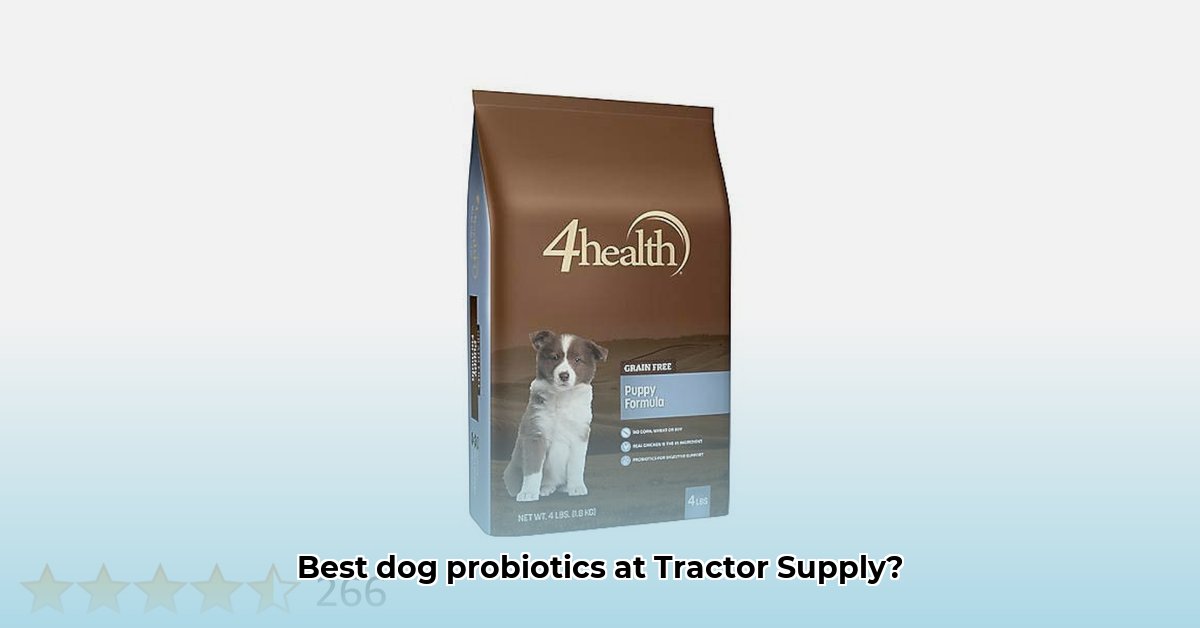
Giving your dog a healthy gut is a simple yet powerful way to support their overall well-being. This guide explores the world of canine probiotics, focusing on options readily available at Tractor Supply, and helps you make informed choices for your furry friend. We'll demystify the science, focusing on practical steps to ensure your dog feels their best. For more information on veterinary services at Tractor Supply, visit Tractor Supply Vet Services.
Understanding Canine Probiotics: The Tiny Helpers in Your Dog's Gut
Imagine your dog's digestive system as a vibrant ecosystem. Probiotics are the beneficial bacteria – the "good guys" – residing within this ecosystem. These microorganisms play a crucial role in digestion, nutrient absorption, and immune function. They help break down food, making it easier for your dog to extract essential nutrients. Furthermore, a robust probiotic population strengthens the gut's natural defenses against harmful bacteria. Prebiotics, on the other hand, act as food for these beneficial bacteria, promoting their growth and activity.
Crucially, it's essential to choose probiotics formulated specifically for dogs. Canine and human gut microbiomes differ significantly, meaning a probiotic effective for humans might not be suitable for dogs. Different probiotic strains offer unique benefits; some focus on digestion, others on immune support. Understanding the specific strains in a product is vital for maximizing its impact.
Choosing the Right Probiotic: Finding the Perfect Fit for Your Pup
Selecting the right probiotic involves careful consideration of several key factors:
1. Strain Identification and Guaranteed Viable Count (GVC): The product label should clearly list the specific strains of beneficial bacteria (e.g., Lactobacillus acidophilus, Bifidobacterium spp.) included and guarantee a minimum number of colony-forming units (CFU) per serving. A higher CFU count indicates a more potent product, as it ensures a sufficient number of live bacteria reach your dog's digestive tract to exert their beneficial effects.
2. Reputable Brands: Tractor Supply offers various dog probiotic brands. While extensive comparative data across brands is limited, researching each brand's reputation, manufacturing practices, and ingredient sourcing is crucial. Look for brands with transparent labeling and positive customer reviews. Remember, independent, large-scale studies comparing different brands are often lacking.
3. Delivery Method: Probiotics are available in several forms:
- Chewables: Often palatable for dogs, making administration easy. However, they can sometimes be pricier and may contain fillers.
- Powders: Easily mixed into food, offering versatility. However, palatability can vary, and some dogs may be sensitive to the smell or taste.
- Capsules: Offer precise dosing and convenient storage. However, some dogs may refuse to consume capsules, requiring manual opening and mixing with food.
4. Dosage and Administration: Always follow the manufacturer's instructions regarding dosage, which typically depends on your dog's weight. However, individual needs can vary considerably. Consulting your veterinarian is crucial for personalized advice on dosage and suitability, especially for dogs with pre-existing health conditions or those taking other medications. They can help tailor a probiotic regimen to your dog's specific requirements.
Potential Benefits and Risks: Weighing the Upsides and Downsides
Probiotics offer numerous potential benefits for canine health. These include improved digestion, enhanced nutrient absorption, strengthened immune function, and potentially reduced occurrences of diarrhea. However, as with any supplement, potential risks exist. Some dogs may experience mild gastrointestinal upset (e.g., gas, loose stools) initially. Allergic reactions, while rare, are possible. Moreover, certain probiotics might interact with other medications your dog is taking. Therefore, consulting your veterinarian before starting any probiotic supplement is paramount, especially for dogs with underlying health concerns.
Probiotics vs. Probiotic-Enriched Foods: A Comparative Overview
Probiotic supplements provide a concentrated dose of beneficial bacteria, offering targeted support for the gut microbiome. Many commercially available dog foods also contain added probiotics, offering a more consistent, though generally lower, intake. The optimal approach depends on your dog's individual needs, preferences, and current dietary habits. Often, a combined strategy—using both probiotic-enriched food and a supplement— may be most effective.
Frequently Asked Questions (FAQ): Addressing Common Queries
How long until I see results? The timeframe varies widely depending on the product, your dog's health, and the specific issue being addressed. You might notice improvements within a few weeks, but significant changes might take longer. Consistency is key.
What if my dog has an adverse reaction? Discontinue the probiotic immediately and consult your veterinarian. Describe the reaction clearly, including any observed symptoms.
How should I store dog probiotics? Follow the storage instructions on the packaging. Many probiotics require refrigeration to maintain optimal potency.
Remember, while probiotics can be a valuable addition to your dog's healthcare routine, they are not a replacement for regular veterinary care. Your veterinarian remains the best resource for personalized guidance on your dog's health and well-being. They can assess your dog's individual needs and recommend the best approach for maintaining optimal gut health.